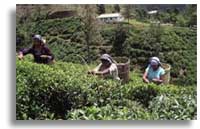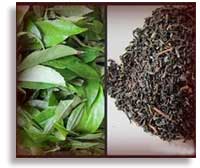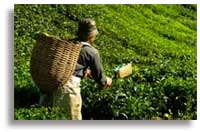TEA MANAGEMENT
Career in Tea management
The day of most of the people in the our country starts with the most refreshing "Tea" India being the world's largest producer, exporter and consumer of tea, there is wide scope for careers in this field. One of the unorthodox career lines that is gaining popularity in India is that of tea management. There is no hot beverage as widely drunk as tea. Originating from Asia tea is something the whole wide world is hooked on to. Today the West beats Asia as the largest consumer of the drink. Tea tasting is one of the highly specialized areas of work. Like researchers, plantation managers, tea brokers, consultants etc.
Nature of work and Job Description
Work in the Tea industry includes plantwork, processing, auctioning, branding, marketing and research. Plantation work involves nurturing tea plants in the plantations which includes preparing the soil, applying the appropriate fertilizers, choosing the right variety best suited for the prevailing conditions and supervising the pinching and plucking of the leaves.Processing work involves the crushing, tearing and curling of the leaves, which takes place in the factories.The tea is then packed and dispatched to auction centers.The various samples of tea from different plantations are tested, blended and branded by the tea tasters in the auction centers. Most tea companies employ tea tasters for ensuring quality standards, and preparing blends. Tea tasting is typically learnt on the job
Job Opportunities
India being the leading producer of tea in the world, the scope for a career in this field is immense. Tea companies or tea gardens. New entrants are taken on as Assistants at the plantation level. After gaining experience and competence an assistant can get promoted to the level of Assistant Manager, and then Manager of a tea garden. Most assistants can expect to become managers in 12-15 years of service.
Tea Taster
Tea tasting is a highly specialized area. Tea tasters can easily differentiate between the various flavours of tea and help to brand the varieties according to quality. Tasters are recruited by manufacturing companies, brokers as well as buyers. In a manufacturing company, the taster detects easily the defects in the production process by looking at the colour and size of the leaves to determine if they have been fermented or dried under fire and sends them back to the factory to rectify if needed. They also have to coordinate with gardens, look after import and exports, advise researchers on commercial factors like taste, economic viability and maturability of tea etc.

Researcher
Research is an integral part of the industry. Most part of the research is conducted by botanists, biotechnologists and other scientists, who study methods of producing disease-resistant, high yielding varieties of tea, as also strains that produce leaves that are natural blends of various teas. They receive advice from tea tasters on commercial factors like taste, economic viability and maturability of tea. The Tea Research Association at Jorhat (Assam) is a premier organization where pioneering work is being done in the field of research.
Tea Brokerss

Consultants
The tea board of India and various tea associations employ consultants. Experienced tea planters can take up consultancy services proffering advice on the varieties of tea to be planted, new varieties and their sources, recruitment and training of personnel, compensation, benefits and incentives to labour and so on.
Plantation / Factory Managers
Tea gardens are mainly controlled by Managers who have junior assistants and Assistant Managers, depending on the size and requirement of the garden, to assist them in the smooth functioning of the tea estate. Their in the fields work involves supervision of all plantation work involved from planting to plucking, processing to packing and transport of tea to auction houses. New entrants are been moslty taken on as Assistants at the plantation level. Experience person is the deciding factor in the appointment of a manager. It is a long wait as it usually takes twelve to fifteen years. The Indian Institute of Plantation Management, which is in Bangalore offers a training programme on the relevant subject under the Indian Commodity economy.
Industry

Top Recruiter/Companies
Scope in India: Career opportunities in Tea Management though not varied, are quite lucrative. Tea Management personnel can be employed in -
- The Tea Board of India
- Tea Associations
- Tea Plantations
- tea broking houses
- As tea consultants
- As research personnel in tea research associations
- Tata Tea
- Red Label Tea
- Lochan Tea
- Godrej Tea
- Tata Tea Limited
- Unilever brands
- Brooke Bond
- Lipton
Eligibility
A degree in Agricultural Science or a B.Sc. in Botany, Food Sciences, Horticulture or allied fields is preferred. Candidates who have specialized in business management or marketing are recruited for marketing jobs. New entrants are taken on as Assistants at the plantation level. After gaining experience and competence an assistant can get promoted to the level of Assistant Manager, and then Manager of a tea garden. Most assistants can expect to become managers in 12-15 years of service. Potential tea tasters selected are trained on the job. Besides natural talents, vigorous training for a number of years is essential before becoming a professional tea taster and then a tea tasting manager. Besides acquiring skills in tasting, they need to work on their managerial and marketing capabilities too.
Desired & Essential Skills

Remuneration
A field most suited for nature lovers, as working on a plantation may seem like living in a virtual paradise for those who like living in close proximity to nature. However, long spells of loneliness are a common occurrence. Despite the drawback, many youngsters are coming into the profession because of the good pay, attractive perks including a comfortable lifestyle with bungalow, car etc. Trainees get, on an average, Rs. 5,000 while senior professionals draw Rs. 25,000 per month and specialized professionals can earn in the range of 40,000- 50,000 per month.
Success Stories
Leading Indian entrepreneur taking tea exports to new heights
- AMBO, which today ranks amongst the leading merchant exporters in India, was founded in 1992 and the man behind its success is Mr O P Agarwal, Chairman and Founder, Ambo Group. His vision, passion and dedication to make AMBO one of the leading tea brands in not only India but all over the world have borne its fruits.
- Before founding AMBO, he was associated with a multinational company for over 2 decades in a senior capacity, where he learnt the tricks of the trade. His rich and diverse experience in the field of exports management, marketing and distribution of consumer goods and finance enabled him to steer the company forward to scale great heights.
- Under his leadership, AMBO achieved the Government of India recognition and has been an “export house” status holder since 1998. Mr Agarwal’s foresightedness, management skills, expertise and dynamic outlook enabled AMBO to establish its footing in international markets and venture into diversified business sectors.
- The management of the Kanan Devan Hills Plantation Company was handed over to the workers. Tata Tea retains 19 per cent stake in the company.Tata Tea, which is the largest manufacturer of Assam tea and Darjeeling tea, is moving out of plantations operations. The company, however, plans to retain its holdings in overseas plantation operations, mainly in the Watawala plantations of Sri Lanka. Tata Tea is the second largest manufacturer of Ceylon tea. Almost 41 per cent of the 12,442-hectare Watawala plantations is under tea, 18 per cent is under rubber, 8 per cent is under oil palm and the remaining is under fuel wood.
- While Tata Tea does not have any plans to acquire large overseas plantations, the Kanan Devan Hills Plantation Company has received invitations from the governments of Ethiopia and Uganda to set up and manage large plantations there. It is up to Kanan Devan to assess the challenges and opportunities and determine how best to go about such projects, Mr Krishna Kumar added.
Institutes
Tea management |
Experts Opinion
Innovation is the key to boost Assam tea's chances of reclaiming its much-sought after position in the world market, with research and marketing needed to back production, said an expert today. ''The traditional tea consumers market is facing competition from new-age tea formulations. Assam tea entrepreneurs must seize the moment and open up to a new area of development,'' said Gautam Prasad Baroowah, business economist and human resource management expert.
